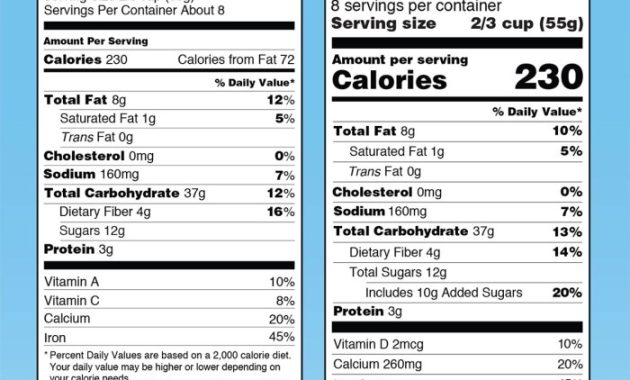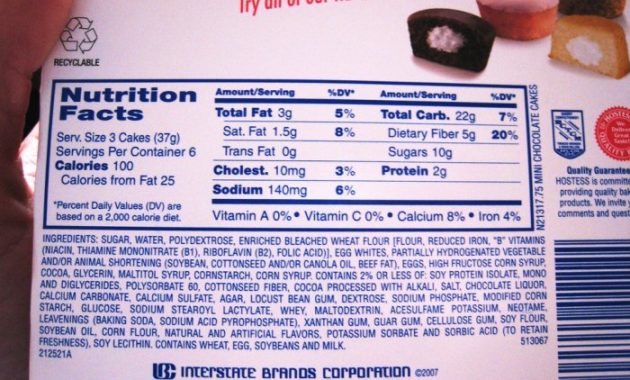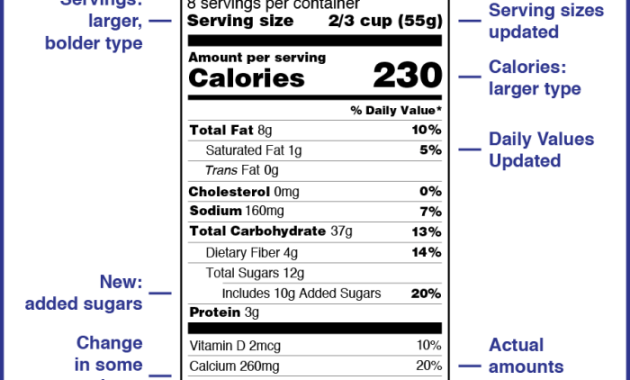Understanding Celsius Packets

Celsius packets nutrition facts – Celsius packets, vibrant bursts of energy in convenient single-serve form, offer a concentrated dose of stimulants and nutrients designed to enhance performance and focus. Understanding their nutritional composition is key to making informed choices about their incorporation into one’s diet.
Curious about Celsius packets nutrition facts? You’ll find they’re surprisingly low in sugar compared to some other energy drinks. For a different protein boost, check out the detailed breakdown of nutrition facts of whey protein powder – it’s a great way to compare macronutrient profiles. Then, you can decide whether Celsius or whey protein better fits your fitness goals and return to examining those Celsius packet nutrition facts in more detail.
Typical Ingredients in Celsius Packets
A typical Celsius packet contains a blend of ingredients carefully selected for their synergistic effects. These include a proprietary blend of vitamins and minerals, often including B vitamins for energy metabolism, along with caffeine for its stimulating properties. Other common ingredients include taurine, an amino acid often associated with improved mental performance, and guarana extract, another natural source of caffeine.
Artificial sweeteners are frequently used to control the sweetness level, and various natural and artificial flavors contribute to the diverse range of Celsius’ product line. The precise formulation may vary slightly depending on the specific flavor.
Macronutrient Composition of Celsius Packets
A standard serving of Celsius powder, typically mixed with water, presents a low-calorie profile, generally boasting minimal carbohydrates, protein, and fat. The caloric content is primarily derived from the carbohydrates, which are often present in small amounts to provide a readily available source of energy. Protein content is negligible, and fat is essentially absent in a typical serving. This macronutrient composition makes Celsius packets a relatively low-calorie energy boost option compared to many other energy drinks or sports drinks.
Micronutrient Content of Celsius Packets
Celsius packets are fortified with a variety of vitamins and minerals designed to complement the energy boost. The vitamin B complex is a prominent feature, contributing to various metabolic processes crucial for energy production. Other micronutrients may include vitamin C, an antioxidant, and various minerals such as potassium and magnesium, essential for electrolyte balance. The specific vitamin and mineral profile can vary slightly based on the particular flavor and formulation.
It’s crucial to refer to the nutrition facts panel on the individual packet for precise details.
Nutritional Profile Comparison: Celsius vs. Similar Energy Drinks
| Nutrient | Celsius (per serving) | Competitor A (per serving) | Competitor B (per serving) |
|---|---|---|---|
| Calories | 10-20 (approx) | 100-150 (approx) | 80-120 (approx) |
| Carbohydrates (g) | 1-5 (approx) | 20-30 (approx) | 15-25 (approx) |
| Protein (g) | 0-1 (approx) | 0-2 (approx) | 0-2 (approx) |
| Fat (g) | 0 (approx) | 0 (approx) | 0 (approx) |
| Caffeine (mg) | 150-200 (approx) | 80-120 (approx) | 100-150 (approx) |
Note
These values are approximate and can vary depending on the specific product and serving size. Always refer to the product label for accurate nutritional information. Competitor A and B are placeholders for similar energy drink products. Specific brands and their nutritional profiles should be researched independently.*
Potential Health Implications of Regular Celsius Consumption
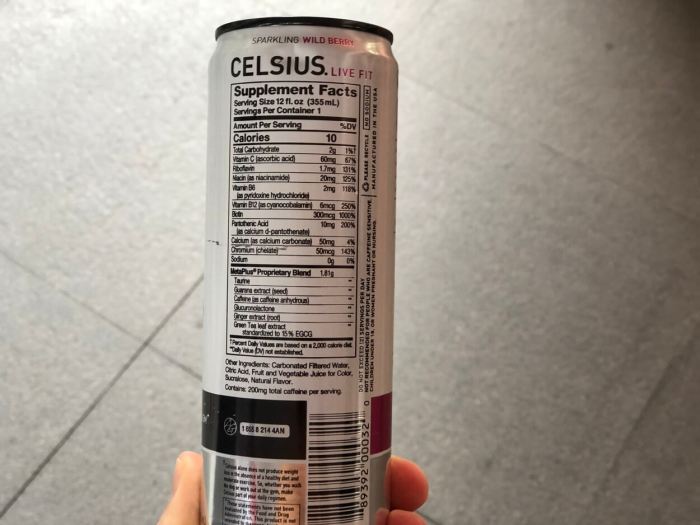
The vibrant energy promised by Celsius packets, while enticing, warrants a careful consideration of its potential long-term effects on health. Regular consumption, driven by the allure of a quick boost, may inadvertently sow the seeds of various health concerns, impacting cardiovascular well-being, sleep cycles, and mental clarity. Understanding these potential implications is crucial for making informed choices about beverage intake.
Cardiovascular Health Impacts
The high caffeine content in Celsius, while providing a temporary surge in energy, can exert considerable strain on the cardiovascular system. Excessive caffeine intake is linked to increased heart rate and blood pressure, potentially contributing to heightened risk of arrhythmias and other cardiac complications over time. For individuals with pre-existing heart conditions, regular Celsius consumption presents a significantly amplified risk.
This is not to say that moderate consumption poses a serious threat to everyone, but regular, high doses can be problematic. Consider the example of a marathon runner who consumes multiple packets daily: the cumulative effect on their heart over time could be considerable.
Impact of High Caffeine on Sleep and Mental Well-being
Caffeine’s stimulating effects extend far beyond a simple energy boost. Regular consumption, particularly in high doses as found in multiple Celsius packets, can disrupt sleep patterns, leading to insomnia, reduced sleep quality, and daytime fatigue. This disruption of the body’s natural circadian rhythm can negatively impact cognitive function, mood regulation, and overall mental well-being. A person habitually consuming Celsius late in the day might experience difficulty falling asleep, leading to decreased productivity and irritability.
The chronic sleep deprivation resulting from this could have far-reaching consequences.
Risks Associated with Artificial Sweeteners
The artificial sweeteners prevalent in many Celsius formulations present another area of concern. While they avoid the caloric burden of sugar, their long-term health implications remain a subject of ongoing research. Some studies suggest a possible link between artificial sweetener consumption and an increased risk of metabolic disorders, such as type 2 diabetes and weight gain, potentially negating any perceived health benefits.
The long-term effects of these sweeteners on gut health are also being explored. The potential for these sweeteners to disrupt gut microbiota, which plays a significant role in overall health, is a factor to consider.
Visual Representation of Overconsumption Consequences
A stark image emerges: a heart burdened by excessive caffeine, its rhythm erratic and strained. Sleep, fragmented and shallow, is represented by a fractured moon, its light dimmed. A clouded brain, struggling to focus amidst the fog of caffeine-induced anxiety and sleep deprivation, contrasts with the sharp clarity of a well-rested mind. Finally, a silhouette of a person, overweight and burdened, symbolizes the potential metabolic consequences of long-term artificial sweetener consumption. This illustrates the potential for a cascading effect, where one area of health is compromised, influencing others.
Comparing Celsius Packets to Other Energy Boosters
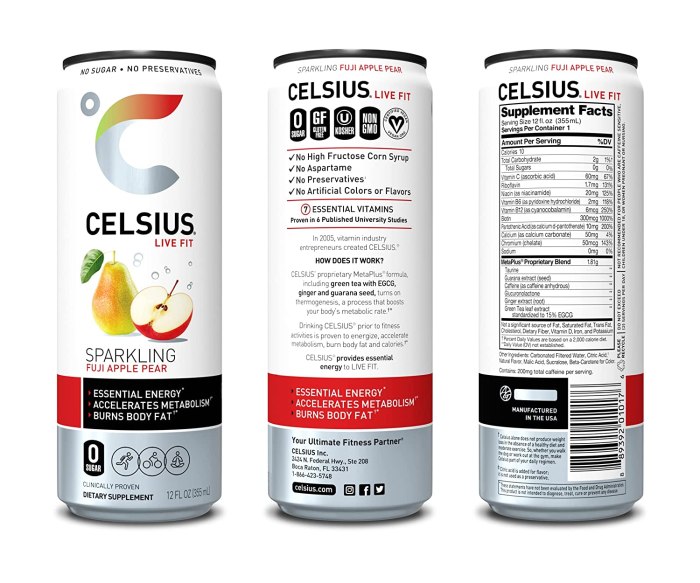
The quest for sustained energy often leads us to various stimulants, each with its own unique profile of benefits and drawbacks. Understanding the nuanced differences between these options is crucial for making informed choices that align with individual health goals and preferences. This comparison examines Celsius packets within the broader landscape of energy-boosting options, highlighting their strengths and weaknesses relative to established contenders like coffee, tea, and traditional energy drinks.
Celsius packets, with their blend of vitamins, electrolytes, and stimulants, occupy a distinct niche in the energy market. Their appeal lies in their convenient, powdered form and the purported absence of certain ingredients found in other energy drinks, such as high fructose corn syrup. However, a comprehensive comparison reveals a complex interplay of ingredients and potential health implications that require careful consideration.
Celsius Packets Compared to Coffee and Tea, Celsius packets nutrition facts
Coffee and tea, venerable energy sources enjoyed for centuries, offer a different approach to energy enhancement. Their stimulating effects primarily stem from caffeine, a naturally occurring compound. While both provide a sustained energy boost, the levels of caffeine vary considerably depending on the type and brewing method. Unlike Celsius, coffee and tea also offer a range of antioxidants and other bioactive compounds that contribute to overall health.
However, excessive consumption of coffee or tea can lead to caffeine-related side effects such as anxiety, insomnia, and digestive upset. Celsius, with its proprietary blend, aims to provide a more controlled and balanced energy experience, minimizing some of these potential negative effects. The key difference lies in the addition of other stimulants and the absence of naturally occurring antioxidants found in coffee and tea.
Celsius Packets Compared to Energy Drinks
Traditional energy drinks typically contain high levels of sugar, caffeine, and other stimulants, often in a less controlled blend than Celsius. This can lead to a rapid surge in energy followed by a pronounced crash, along with potential health risks associated with high sugar intake. Celsius packets, while containing stimulants, generally contain less sugar and are marketed as a healthier alternative.
However, the specific blend of stimulants in Celsius and other energy drinks can vary significantly, leading to different physiological responses and potential side effects. The absence of high fructose corn syrup in Celsius is often touted as a significant advantage.
Healthier Alternatives for Energy Enhancement
Beyond the realm of supplements and stimulants, several healthier approaches exist for boosting energy levels. Adequate sleep, a balanced diet rich in fruits, vegetables, and whole grains, and regular physical activity are fundamental pillars of sustained energy. Staying hydrated by drinking plenty of water is also crucial. Mindfulness practices, such as meditation and yoga, can help manage stress and improve energy levels.
These approaches offer a holistic and sustainable way to enhance energy without relying on external stimulants.
Comparison Table of Energy Boosting Options
| Energy Booster | Pros | Cons | Health Implications |
|---|---|---|---|
| Celsius Packets | Convenient, less sugar than many energy drinks, vitamins and electrolytes | Proprietary blend, potential stimulant side effects, cost | Potential for caffeine-related side effects, depends on individual sensitivity |
| Coffee | Readily available, inexpensive, antioxidants | Can cause jitters, anxiety, insomnia, potential for acid reflux | Potential for caffeine addiction, depends on individual sensitivity and consumption level |
| Tea | Antioxidants, less caffeine than coffee, calming effect (some varieties) | Can contain caffeine, may interact with medications | Generally lower risk than coffee, but individual sensitivities vary |
| Energy Drinks | High caffeine content, immediate energy boost | High sugar content, potential for “crash,” artificial ingredients | Risk of heart problems, increased blood pressure, potential for sugar-related health issues |
| Healthy Lifestyle | Sustainable energy, improved overall health, reduced risk of chronic diseases | Requires commitment and consistency | Positive impact on cardiovascular health, mental well-being, and energy levels |
FAQ Insights: Celsius Packets Nutrition Facts
Are Celsius packets suitable for vegetarians/vegans?
Check the ingredient list; most Celsius packets are suitable for vegetarians but may not be vegan due to potential animal-derived ingredients or processing aids. Always verify.
How many Celsius packets should I consume per day?
Start with one packet and monitor your response. Excessive caffeine intake can lead to negative side effects. Consult a healthcare professional for personalized guidance.
Can I mix Celsius packets with other beverages?
Yes, many people mix Celsius packets with water, juice, or other beverages. However, always check the product instructions for recommended mixing guidelines.
Are there any drug interactions with Celsius?
Because Celsius contains caffeine and other stimulants, there’s a potential for interactions with certain medications. Consult your doctor or pharmacist if you have concerns.

